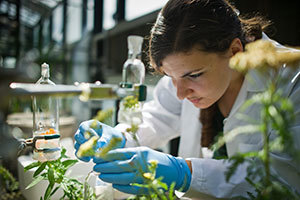
Twelve University of Notre Dame researchers, students from the Graduate School and the College of Arts and Letters, have been selected by the United States Agency for International Development’s (USAID’s) brand-new Research and Innovation Fellowship Program. They will travel to Brazil, Colombia, India and South Africa to research global development challenges and create innovative solutions to address these issues.
The University of Notre Dame is one of six universities selected by USAID’s new U.S. Global Development Lab to offer these fellowships, which are officially known as the USAID | Notre Dame Global Development Fellowships. The Notre Dame Initiative for Global Development (NDIGD) was selected to manage this fellowship for the University. The other successful universities include Arizona State University, Rutgers University, University of California-Berkeley, University of California-Davis and the University of Chicago.
Speaking about the program, Michael Sweikar, managing director of NDIGD, said, “I am thrilled that NDIGD has been selected amongst the six elite universities to manage this fellowship. This is a tremendous opportunity for Notre Dame students to develop their research and leadership skills as USAID Fellows.”
Partnering with host organizations in Brazil, Colombia, India and South Africa, the 12 Notre Dame students will be completing research projects throughout 2015 and 2016. The successful researchers and their research projects are as follows:
John Dillon, a Ph.D. student in the Department of English, will complete his research at IBM in Bangalore, India. He will be working on the IBM Smarter Education Initiative.
Elisa Ditta is working on her master’s degree in peace studies at the Kroc Institute. Her research project is titled “Challenges for Schools for a Culture of Peace in Post-Conflict Colombia” and will take place in Cartagena, Colombia.
Meghan Gallagher, a Hesburgh-Yusko scholar and the only undergraduate student to be selected, is currently a junior in political science and French. She will travel to Stellanbosch, South Africa, to undertake research on “Exploring Mobile Technologies and Applications to Advance Development Objectives.”
Craig Iffland, a Ph.D. student in the Department of Theology, will research “The Applicability of International Humanitarian Law in Contemporary Armed Conflict” in Johannesburg, South Africa.
Stefanie Israel will research “Comparative Ethnography of Pacified Favelas” in Rio de Janeiro, Brazil. She is currently a Ph.D. student in the Department of Sociology and is also supported by the Kellogg Institute for International Studies.
Emily Maiden, a political science and peace studies Ph.D. student, will undertake research on “Varieties of Democracy,” a Kellogg Institute project, in Cape Town, South Africa.
Robert McCune will travel to Pretoria, South Africa, to complete research on a project titled “Measurement Metrics and Performance Evaluation of New Real Time Media Overlay Network Distribution Protocols.” He is currently a Ph.D. student in the Department of Computer Science.
Cecilia Lero, a Ph.D. student in political science, will research “Varieties of Democracy,” a Kellogg Institute project, in Sao Paolo, Brazil.
Michael Penta will work on a research project titled “Research on the Network Effects of Pacification.” He is a current Ph.D. student in the Department of Sociology and is also supported by the Kellogg Institute.
Annette Ruth will travel to Bogota, Colombia, to complete research on “Zebrafish as an Animal Model to Study Trypanosoma Cruzi Motility.” She is a recent graduate of the Masters of Science in Global Health and is a current Ph.D. applicant in the College of Science.
Lucia Tiscornia, a political science Ph.D. student, will undertake research on the “Varieties of Democracy,” a Kellogg Institute Project, in Cape Town, South Africa.
Kelsey Whiting-Jones will participate in a research project called the “African Transitional Justice Study” in Cape Town, South Africa. She is currently a master’s student in peace studies at the Kroc Institute.
The research sites working with USAID to offer these opportunities are locally based organizations that have applied for graduate-level researchers to assist them in growing innovative solutions for global development challenges, with the hope of making a positive impact in communities around the world.
“Having on-the-ground researchers who can tackle global development challenges can truly make a difference to the lives of those in developing countries, and NDIGD is uniquely placed to deliver this,” said Robert J. Bernhard, vice president for research at the University of Notre Dame. Bernhard continued, “This type of translational research coincides well with the mission of the University to be a powerful means for doing good in the world.”
NDIGD is working to build a just and equitable world by connecting faculty to corporate and governmental partners, training researchers, providing fellowship and research opportunities, and measuring the impact of global development initiatives worldwide.
Contact: Joya Helmuth, NDIGD outreach associate, jhelmuth@nd.edu